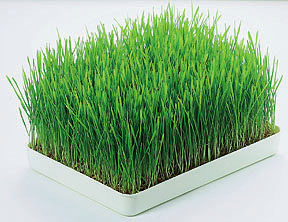Wheat Grass

Wheatgrass (Triticum aestivum) is a popular juicing ingredient made from the newly sprouted shoots of wheat grains. Rich in chlorophyll, beta carotene and antioxidants, wheatgrass is touted as a natural remedy for a number of health conditions.
Contents
Special Precautions of Wheat Grass
Although wheatgrass is generally considered safe, it may trigger certain side effects (such as nausea, headache, hives and swelling in the throat). Since hives and a swollen throat can signal a serious allergic reaction, it's important to seek immediate medical attention if you experience either symptom after consuming wheatgrass.
The benefits of Wheat Grass are
- To date, very few studies have tested the potential health benefits of wheatgrass. What's more, there's no evidence to support the claim that chlorophyll can combat cancer.
- This therapy consists primarily of detoxification and consuming a wheat-grass drink several times each day. Fresh wheat grass in this form is a potent source of many vitamins, minerals and plant enzymes. Thus, it is said to be nature's own nutritional program. Wheat grass also contains Amygdalin (Laetrile), although other sources, such as apricot seeds are more potent.
- Proponents claim that wheatgrass offers a broad range of health benefits. For instance, wheatgrass is said to boost the immune system, aid in detox, increase energy, improve digestion, reduce cravings, preserve eyesight, promote weight loss and stimulate the thyroid.
- In addition, some proponents suggest that the chlorophyll found in wheatgrass can raise the body's oxygen levels and, in turn, treat or prevent cancer.
- Wheatgrass is also purported to fight the following health problems: bronchitis,the common cold, constipation, gout, high blood pressure, high cholesterol, indigestion, inflammation, insomnia, ulcerative colitis
- Wheatgrass and Ulcerative Colitis : Wheatgrass may help ease ulcerative colitis, according to a small 2002 study in the Scandinavian Journal of Gastroenterology. For the study, 23 patients with ulcerative colitis were given either wheatgrass juice or a placebo beverage every day for a month. Looking at data on the 21 patients who completed the study, researchers found that treatment with wheatgrass juice significantly reduced disease activity and the severity of rectal bleeding.
- Wheatgrass and Chemotherapy : Wheatgrass may help fight myelotoxicity caused by chemotherapy, suggests a 2007 pilot study in Nutrition and Cancer. A potentially life-threatening condition, myelotoxicity is marked by suppression of bone marrow activity. The study involved 60 patients undergoing chemotherapy for breast cancer. Among those given a daily serving of wheatgrass juice during the first three cycles of chemotherapy, researchers observed a significant reduction in myelotoxicity. Although wheatgrass juice did not appear to interfere with the effects of chemotherapy, six patients did experience a worsening of nausea that resulted in their discontinued use of wheatgrass juice.
- Wheatgrass and High Cholesterol : Animal-based research indicates that wheatgrass may help lower cholesterol. In a 2011 study from Acta Poloniae Pharmaceutica, scientists discovered that treatment with wheatgrass juice helped reduce total cholesterol and LDL ("bad") cholesterol in rats with abnormally high cholesterol levels. However, it's not known whether wheatgrass might have the same cholesterol-lowering effects in humans.
References
Medical Disclaimer
This information is not meant to be substituted for medical advice. Always consult a medical professional regarding any medical problems and before undertaking any treatment or dietary changes.